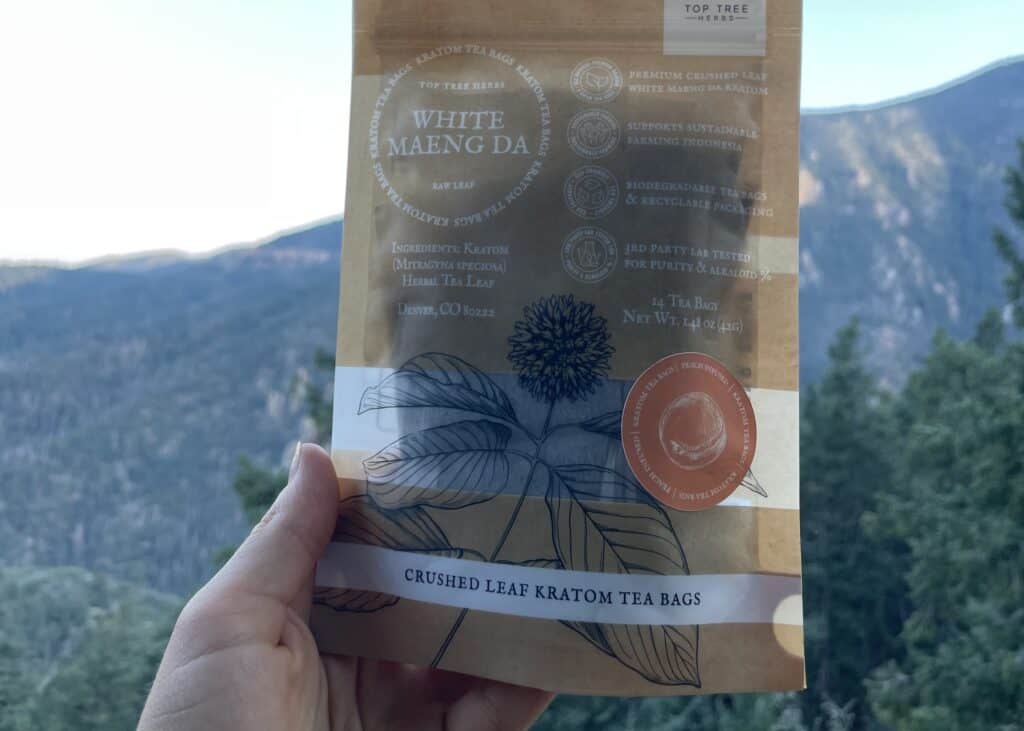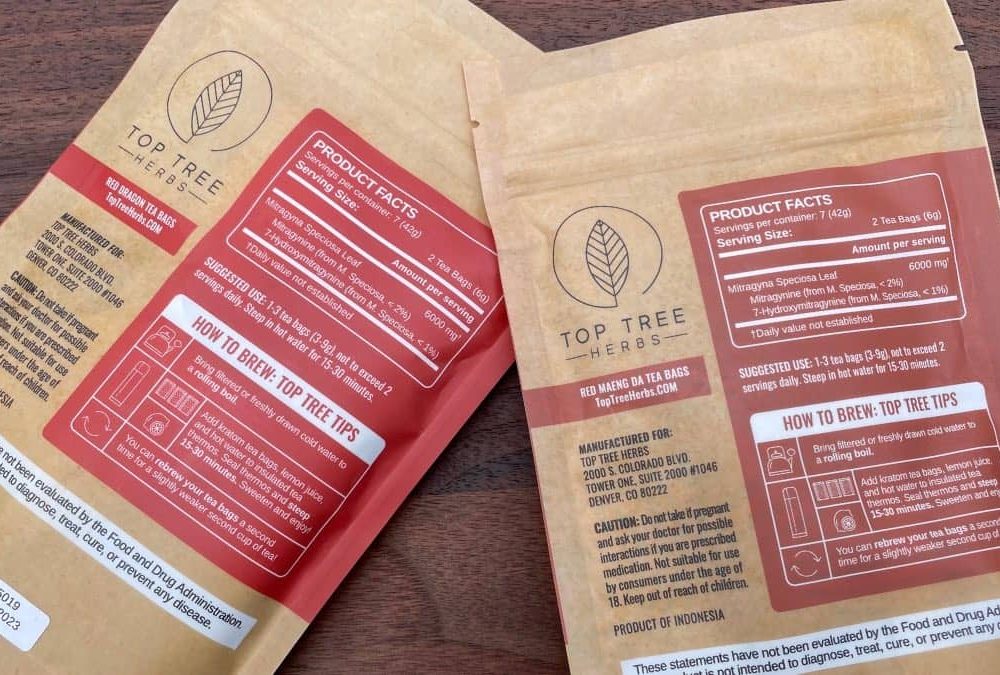An important disclaimer: we are not lawyers, and the following discussion of what kratom vendors are allowed to say about their products should not be considered legal advice.
It is provided solely to help kratom consumers and vendors better understand the regulatory status of kratom, and how they may make more informed decisions when manufacturing or purchasing kratom products.
When it comes to selling and marketing kratom, it’s no walk in the park for kratom businesses. Unlike many other tea and botanical companies, kratom vendors need to be quite careful about what they say about their products. If not, they can find themselves in trouble.
Due to the general lack of knowledge on kratom in the United States, the drastic need for more kratom research, and the propagation of kratom misinformation, this Southeast Asian tree leaf is often misunderstood.
Is Kratom an Approved New Dietary Ingredient?
Though kratom has been consumed as a dietary ingredient for hundreds of years in other countries, kratom has not yet been approved as a new dietary ingredient (NDI) by the US Food and Drug Administration (FDA). As a result, kratom vendors in the US have to take extra care to follow the laws (or lack thereof) when it comes to marketing and labeling their products.
The NDI notifications (which are more like applications) that have been submitted for kratom were for only kratom powder and kratom extract. An NDI notification has not yet been attempted for natural crushed-leaf kratom that’s used to make traditional kratom tea.
While many kratom businesses have a good understanding of what they can and can’t say when advertising their products, some vendors don’t fully know to market kratom properly. This makes it really hard for vendors to say anything at all about kratom, which in turn makes it hard for customers to feel confident in what they’re buying.
To help vendors and customers alike, we’ll shed some light on what kratom vendors can and can’t say when marketing their products.
Can You Market Kratom As a Supplement?
In order to market kratom, vendors must carefully choose which words they use when discussing the plant, as it is not considered an approved dietary supplement by the FDA. Therefore, although websites sometimes refer to “kratom supplements,” you can’t actually sell kratom as a “supplement.”
The American Kratom Association (AKA) maintains that kratom should be regulated and sold as a food. This makes sense for crushed-leaf kratom products in particular, given that kratom tea is the traditional form of kratom consumption.
This doesn’t mean that kratom is illegal, but it does mean that it’s not fully regulated by the FDA in the way that other foods and supplements are. The AKA and individual kratom activists have successfully lobbied for kratom regulation at the state level following AKA guidelines in the Kratom Consumer Protection Act (KCPA).
However, there are still a handful of states where kratom is illegal, as well as a number of states where kratom is legal but not yet regulated.
Because the FDA has not approved kratom as a dietary supplement, consumers must use discretion when choosing a kratom vendor. While dietary supplement companies can use structure/function claims, kratom brands cannot use such claims.
Kratom Capsules for On-The-Go Ease
Three Types of Claims That Supplements Companies Can Make But Kratom Vendors Can’t
Since it’s illegal for a vendor to sell kratom as a supplement (or a drug, for that matter), they can’t make the same marketing claims that supplement companies are allowed to use.
There are three primary types of claims that supplement companies can make:
- Health claims
- Nutrient content claims
- Structure/function claims
Before we get into what marketing claims kratom companies can and can’t make, let’s cover the definitions of each type of claim.
Structure/Function Claims
Structure/function claims are the most common, permissible claim used for dietary supplements. However, as kratom is not yet approved as a supplement, kratom vendors can not use structure/function claims when marketing kratom.
So, what are structure-function claims? Well, the Dietary Supplement Health and Education Act of 1994 (DSHEA) defines structure/function claims as statements describing how a nutrient or dietary ingredient affects or maintains the normal structure or function of the human body or general well-being.
Requirements for Structure/Function Claims
Makers of approved dietary supplements can market their products using structure/function claims without prior approval. To make a structure/function claim, the company marketing the product must meet the three following requirements:
- Have substantiation that the claims are truthful and not misleading; you must substantiate the claims before you make them.
- Notify the FDA and provide the text of the claim at least 30 days before marketing your product.
- Provide a disclaimer such as, “This statement has not been evaluated by the FDA,” on product labels featuring the claim.
Types of Structure/Function Claims
There are also two types of claims that dietary supplements manufacturers/vendors can make relating to structure/function claims:
- General well-being claims describe how a person’s general well-being may be supported by consuming a nutrient or dietary ingredient.
- Nutrient-deficiency disease claims describe the supplement’s benefit related to a nutrient-deficiency disease. When making these claims, it is required to state how widespread the disease is in the United States.
While these requirements may sound straightforward, even within the supplement industry, there’s a fine line between which kinds of claims are legal and which aren’t.
For instance, it’s easy for supplement brands to confuse structure/function claims and disease claims.
While they can make nutrient deficiency claims, supplement companies can not make statements about the supplement’s benefits for treating or curing any disease that is unrelated to nutritional deficiencies. This type of claim is limited to drug marketing.
Examples of Structure/Function Claims
Here are some incomplete examples of permissible structure/function claims (when supported by evidence and used to market supplements):
- “Helps maintain levels already within the normal range.”
- “Helps maintain proper health.”
- “Promotes health.”
- “Use as part of your diet to maintain healthy levels.”
Why didn’t we fill in the blanks in the above examples? As a kratom company, it’s risky to make any structure/function claims, even ones that aren’t about kratom and are just meant as examples.
This is because such claims could pop up in web searches related to kratom. Consumers could thus end up on our blog post or webpage when looking for products to help them with these health concerns, regardless of whether or not that was intended.
These claims are only permissible with the proper approval and research. On the other hand, impermissible structure/function claims include health claims or make unsubstantiated structure/function claims.
Keep in mind that all structure/function claims are currently illegal to use for advertising and marketing kratom products.
Health Claims
According to the FDA, health claims refer to the relationship between a specific food product or ingredient and a reduced risk of disease or a health condition. Unlike other types of claims, health claims require FDA review prior to use.
Types of Health Claims
There are two types of health claims available for use:
- Authorized Claims: Claims that have been reviewed and approved by the FDA and have “significant scientific agreement” (SSA), meaning there’s a consensus in publicly available information establishing the substance/disease relationship.
- Qualified Claims: Qualified health claims (QHCs) are supported by scientific evidence but do not meet the more rigorous “significant scientific agreement.”
Nevertheless, health claims can represent a challenge to supplement companies. Very few claims are able to meet the SSA standard. Since 1990, the FDA has authorized a mere 12 health claims.
While qualified health claims don’t require “approval” from the FDA like authorized health claims, they must follow the FDA’s issued Letter of Enforcement Discretion that outlines how these claims may be used.
The first step is for manufacturers to submit a petition to the FDA for any and all new health claims. Qualified health claims must also include a disclaimer indicating the degree of scientific evidence behind the claim.
Examples of Health Claims
Keeping in mind that kratom vendors cannot currently use health claims to advertise kratom products, let’s get into some examples of health claims.
Authorized Health Claim Example:
- “Diets low in saturated fat and cholesterol that include 1.7 grams of psyllium husk per day may reduce the risk of heart disease. One serving of [name of food] provides grams of this soluble fiber.”
Qualified Health Claim Example:
- “Psyllium husk may reduce the risk of , although the FDA has concluded that there is very little scientific evidence for this claim.”
Non-compliant/impermissible health claims include unsubstantiated claims of a product treating an illness.
As kratom is not FDA-approved (there’s not enough research to support any kratom-related health claims), it’s illegal to make any health claim when marketing kratom products.
Nutrient Content Claims
The third type of claim for marketing supplements is a nutrient content claim. Nutrient content claims describe the level of a nutrient or dietary substance in the product, using defined terms such as “high” or “good source of.”
Most nutrient content claims apply to ingredients with an established Daily Value (DV), such as vitamin C or calcium. If a nutrient does not have an established DV, the manufacturer is only allowed to specify the amount of the nutrient per serving and may not use the defined terms.
An example of a nutrient content claim is the percentage of a type of nutrient (e.g., Potassium: 20% DV) listed on a product’s label. A company does not have to notify the FDA to make a nutrient content claim. Furthermore, the manufacturer must list all the nutrients referenced in the claim in the Supplement Facts panel.
So, can kratom companies make nutrient claims? The answer is a bit more complicated; we’ll get to that momentarily.

Why Can’t Kratom Companies Make These Claims?
You might be thinking, aren’t the restrictions on marketing kratom a bit much? Shouldn’t it be permissible to use a structure/function claim that’s backed by kratom research? Well, again, the problem has to do with the regulatory status of kratom, which is not approved by the FDA for any purpose. According to the FDA, kratom does not meet the definition of a supplement or a drug for approval.
To make nutrient claims, thorough research on the nutritional profile of a product is needed in addition to FDA approval. Given the lack of scientific evidence, it’s not currently feasible for kratom brands to list the percentages of a particular nutrient in their products.
Regardless, it’s important for vendors to properly label kratom products and provide a transparent list of ingredients.
What Can Kratom Companies Talk About?
With all of these restrictions, you can imagine the challenges that kratom manufacturers, vendors, and brands face when trying to promote their products. Since kratom vendors can’t make any claim about kratom’s effects or nutrient values, it helps to think outside of the box.
For anyone curious about learning how to market kratom, here are some of the things kratom vendors are allowed to say while being careful not to make any health claims about kratom itself.
General Statements About Kratom
Due to all of the misinformation about kratom, it can be tempting for vendors to shed some light on Mitragyna speciosa. However, this can’t be done using anecdotal evidence.
As long as it’s gone about correctly, it’s a good thing to educate consumers on kratom. Statements about kratom must be made using research-backed information. Kratom companies can also provide general information about kratom’s traditional use and its cultural significance.
Some permissible blog topics that vendors can write include “What is kratom?,” “Where does kratom come from?,” “What are kratom vein colors?” and so on. It’s good to find a vendor who makes an effort to educate consumers and offers informative, refreshing articles to the public.
You can also link to articles relating to kratom science, kratom research, and other kratom-related topics, so long as the reason for why you’re linking to the resource isn’t related to a medical claim.
1. Information on the Products and Company
Just because vendors don’t have any wiggle room for avoiding structure/function and health claims doesn’t mean consumers should be in the dark about how various kratom products may affect them. For kratom vendors, it’s relatively crucial to make information about their company and products known to their buyers.
This can include where kratom vendors source their kratom from, what their company values are, and how they create their various types of kratom products.
2. Kratom News, Legality, and Activism
One of the most important things for the kratom community is that they can stay informed on the legal status of kratom in the US and other countries. Kratom vendors can raise awareness for pending bans or other legal changes by publishing articles or emailing their subscribers.
While vendors are not obligated to raise awareness for kratom-related issues, it’s something that vendors should care about, as kratom-related legal changes can affect both kratom businesses and kratom consumers alike.
You can’t underestimate the power of communication in the kratom community. Many people who have signed petitions or sent letters to legislators prevent or remove kratom bans have learned about the opportunity to act from their favorite kratom vendor.
3. State Kratom Regulation
In addition to providing information on the legal status of kratom in different states, one thing that all kratom vendors should address is the importance of kratom regulation.
Though kratom is not regulated on the federal level, there are many states that regulate it. As mentioned previously, the AKA and other kratom activists are pushing to get kratom regulated at the state level via the KCPA.
While some states have passed bills regulating kratom, we still have a ways to go before kratom is regulated in all states. Such a feat requires a lot of momentum and support, so kratom vendors can play a powerful role in showing their support for kratom regulation, informing their customers about the issue, and letting them know how to act.
4. Ingredients, Quality, and Purity Claims
It’s important for us kratom vendors to include transparent information on the source of their kratom, as well as the full list of ingredients.
Kratom companies can emphasize their kratom products’ quality, purity, and manufacturing practices. Some examples that kratom companies can discuss are:
- GMP certification
- Third-party lab-testing for alkaloid concentrations, heavy metals, and microbiological contaminants
- Ingredients and alkaloids concentrations
- Manufacturing methods for heavily-processed kratom products like kratom extract, kratom resin, or kratom gummies
Are ingredient and quality claims required?
In fact, in many of the states where kratom is regulated, some of these list items are required to be placed on kratom product labels.
Many KCPAs stipulate that a company must indicate the concentration or the total amount of mitragynine and 7-hydroxymitragynine on the kratom product label – more on this below.
In the past, kratom companies have insufficiently labeled their products. The company behind the Botanic Tonics Feel Free tonic (which contains both kava and kratom) even went so far as to leave kratom off their tonic’s product label for many years.
5. Product Descriptions
Companies can provide accurate descriptions of their kratom products, such as the source, strain name, vein color, aroma, taste, and alkaloid content (if tested). They can also explain the different methods of consumption, kratom serving size guidelines, and recommendations for storage methods.
6. Customer Reviews and Testimonials
Kratom companies can share customer testimonials that accurately represent their customers’ experiences with their products.
However, any customer testimonials a vendor uses for marketing or promoting on their website should not make specific medical claims or imply that the product can cure or treat any disease.
How to Label Kratom Products Properly
From whichever brand you choose to buy kratom, pay attention to how the product is labeled. Not only should a kratom vendor avoid making any health claims on their product labels, but they should also label them appropriately and transparently.
Many states that have regulated kratom have specific requirements for how to label kratom products. Some common requirements include listing the complete list of any ingredients in the product, the company’s contact info, serving size, guidelines/instructions for consumption, and disclaimers about the potential risks of kratom.
Even if the kratom company is not headquartered in a state that has passed regulatory legislation, a good kratom vendor should still follow the guidelines for labeling their kratom products.
This is important for a few reasons. For one, if they sell kratom to an individual or retailer in a state where kratom is regulated, it’s necessary to follow that state’s laws. Second, it prepares the vendor for selling kratom once the plant is regulated in more states. Finally, it gives customers more of the information they need to make informed purchases and consume products responsibly.
FAQs
Q: Do kratom products need to be labeled “Not for human consumption”?
A: No. In states where kratom is legal in the US, a “not for human consumption” disclaimer is not required.
In Denver, where kratom is banned for human consumption, a “not for human consumption” kratom product disclaimer might be allowed if you’re truly selling kratom for purposes besides consumption. That being said, Denver is an unusual example. Most places where kratom is illegal have banned kratom sales completely, and—in other places where kratom is legal—the disclaimer can even be problematic.
Q: Should kratom be labeled “Not for human consumption,” just in case?
A: While some vendors have labeled their products as being “not for human consumption,” this attempt at a catch-all disclaimer is not only misleading, but it fails to offer the business much legal protection at all. For example, although a company called Society Kratom used this disclaimer, it did not protect them in a lawsuit against the company.
In addition to their problematic use of health claims to advertise kratom, Society Kratom’s product labeling for their Kratom Divine product was deemed to be deficient in disclaimers and instructions, and the company was found negligent in regards to the labeling of their products. This could possibly set a precedent for future cases, meaning that instructions for consumption could eventually be necessary.
In states where kratom is regulated, a vendor can’t sell kratom as “not for human consumption” while making for-consumption claims.
Q: What happens if a kratom company makes illegal health claims?
A: Making any kind of illegal claim can land a company in trouble, potentially resulting in a lawsuit. Usually, the first consequence a kratom vendor will face for making illegal marketing claims is a warning letter from the FDA.
Q: What are FDA Warning Letters?
A: FDA Warning Letters are notices issued for violations of regulations and laws. The recipient of the letter must promptly and adequately correct/remove the problematic claims pointed out in the letter.
If a kratom vendor receives a warning letter and does not quickly make the necessary changes, they can face other enforcement actions, such as an injunction.
Q: What other claims can’t kratom companies make?
A: Besides health claims, disease claims, and structure/function claims, kratom companies can’t make misleading claims or comparative claims.
Q: What is considered a misleading claim?
A: A misleading claim deceives the consumer about the composition, quality, or safety of a kratom brand’s products. Misleading claims include exaggerated or unsupported statements regarding kratom products.
Q: What is a comparative claim?
A: Any direct comparisons between kratom and approved supplements or drugs, or comparisons between kratom products (from their strength to their environmental impact) that have not been substantiated. Kratom companies cannot imply that kratom is a safer or more effective alternative to any medication, nor can they compare the effects of kratom to a drug.
Support A Vendor Who Advertises Kratom Responsibly
Here at Top Tree Herbs, our ambitions span far beyond profits. We set out to not only provide the best kratom tea available but also to normalize consumption and protect the interests of the kratom community as a whole, including kratom vendors.
If you want to make or buy kratom, we’re not here to tell you what you should or should not do.
We’re not experts on FDA regulation or industry tactics, and none of the above should be taken as legal or medical advice. Rather, we’re trying to do our best to promote accurate kratom information within our own legal limitations.
We’re not saying that kratom is entirely without risks, nor are we claiming that kratom tea is perfect for everyone. Yet we believe in our kratom tea bags, and we certainly think that responsibly marketing kratom can go a long way for the community.

We all have something to learn every day. If you come across a kratom vendor who is using illegal medical claims on their website or using improper product labels, we highly encourage you to reach out to them and ask them to fix their mistakes.
Last but not least, if you want to buy kratom tea from us, we’ve got you covered. We’re here to answer any questions you have, whether they’re about what kratom vendors are allowed to say, other topics in the world of kratom, or our products. Transparency all the way!
Cheers and safe sipping, everybody!





